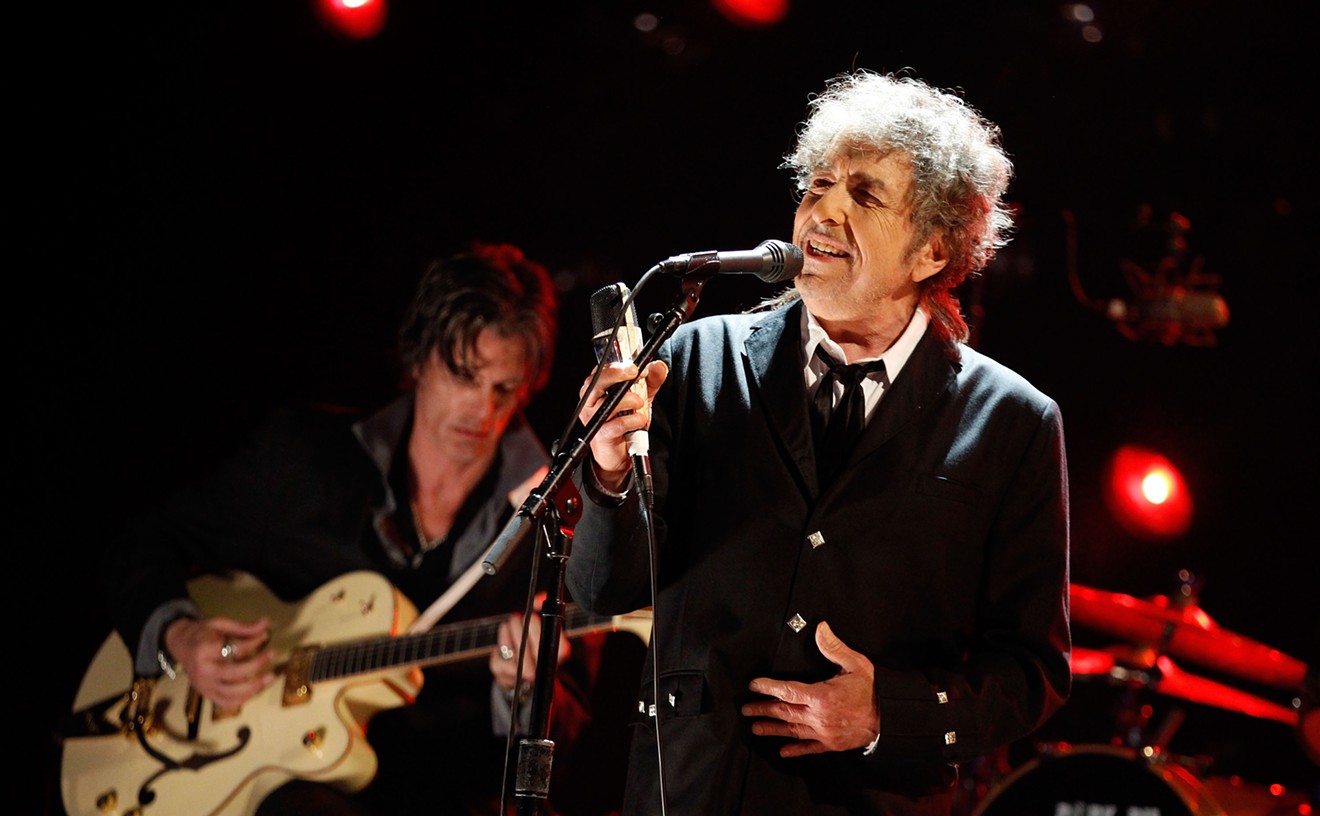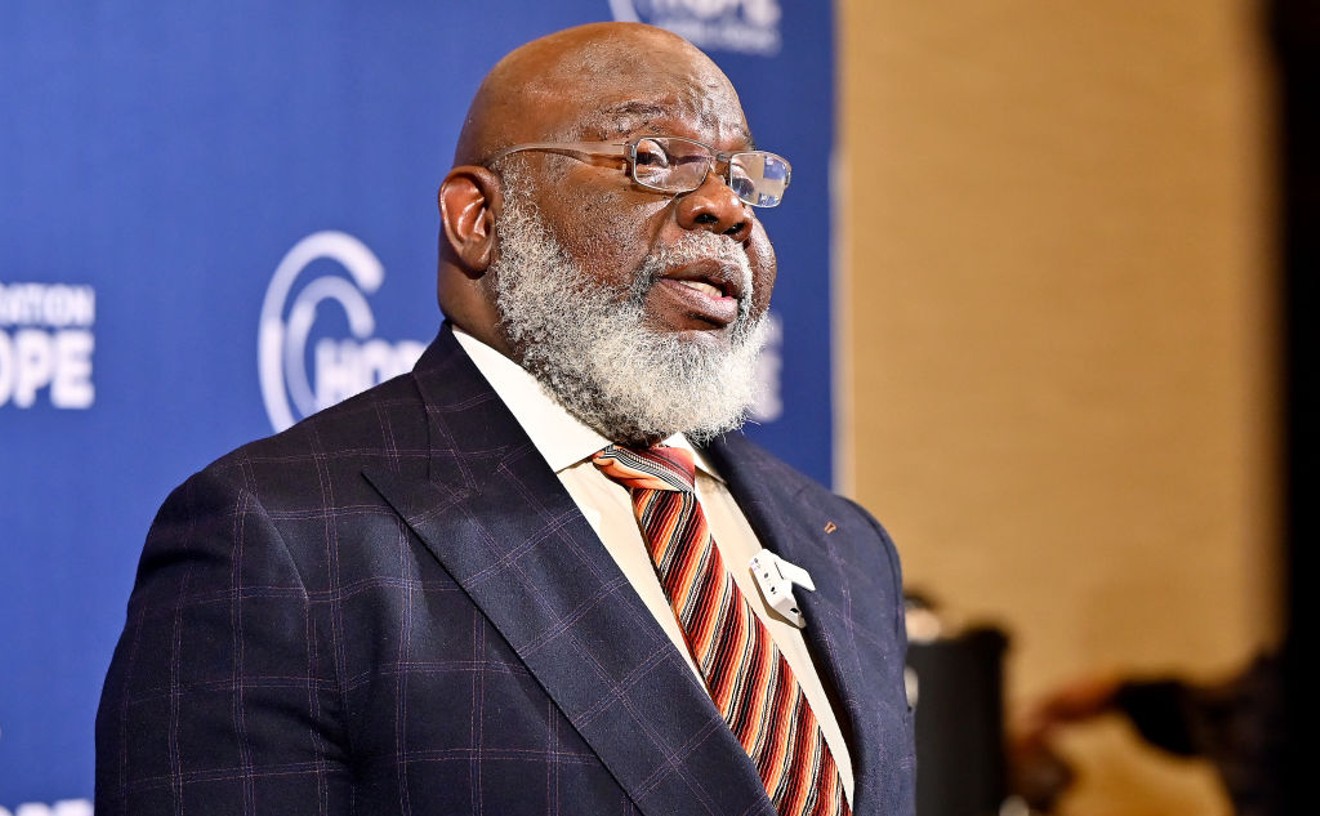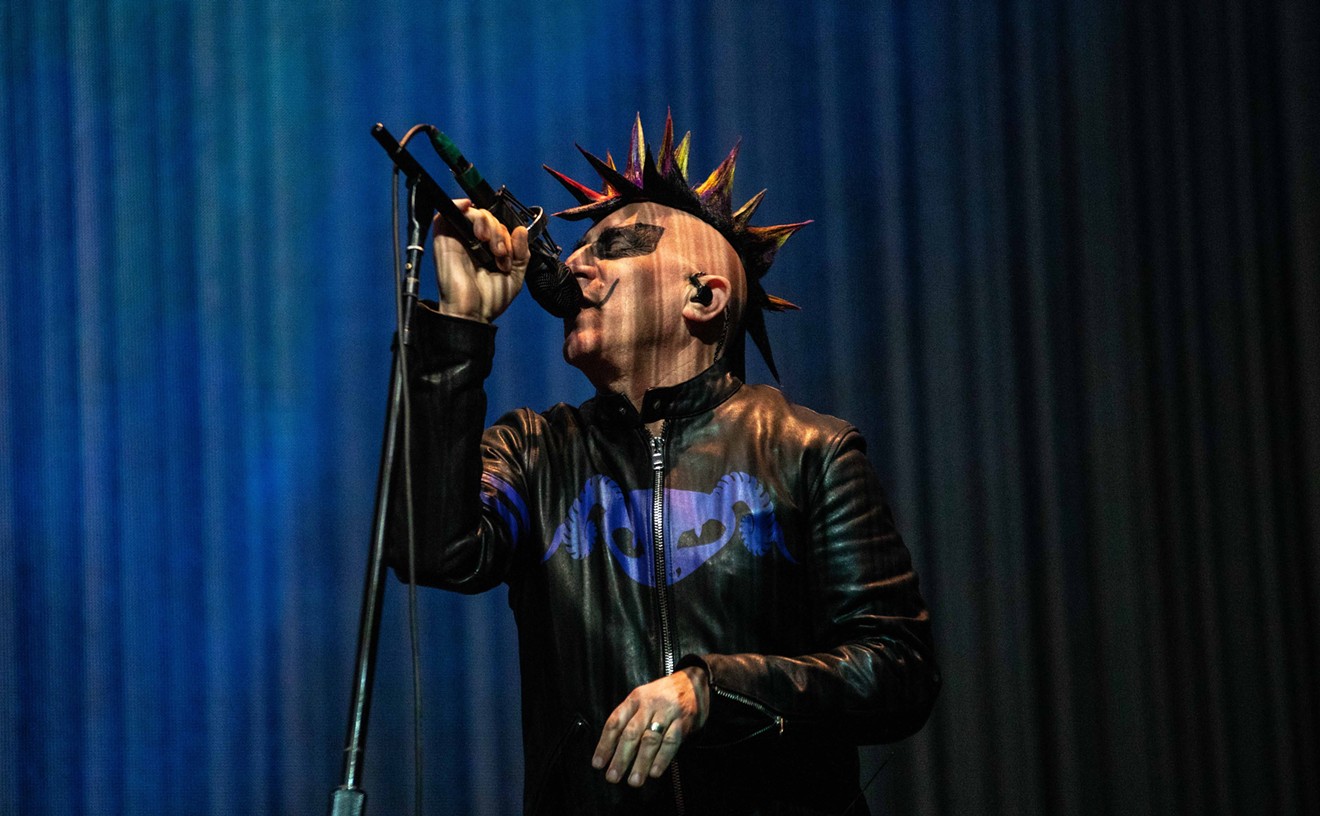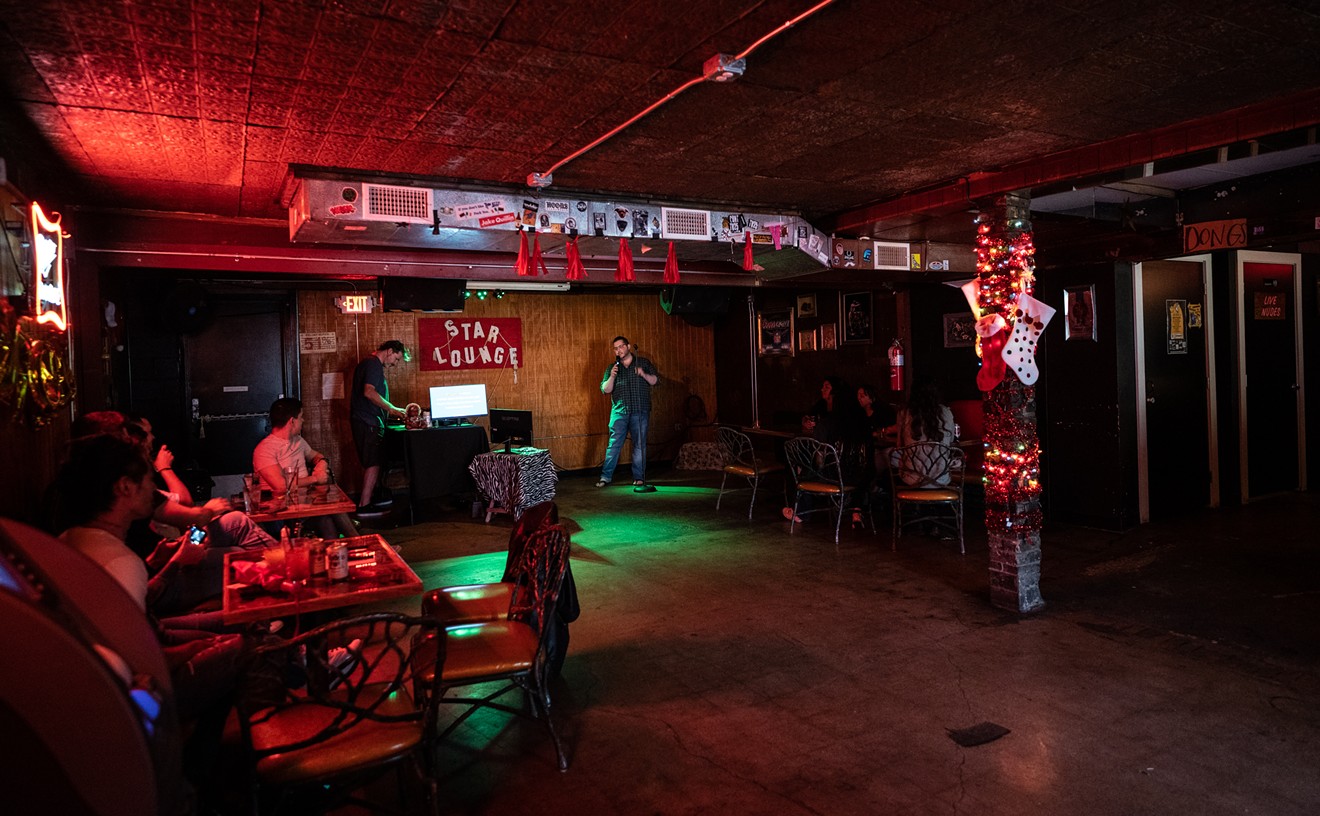Backstage, as he’s making his way to the auditorium from his pre-performance lounge, he announces the closing number to his entourage. There’s an awkward moment of silence, and then a member of his team quietly utters an incredulous “What?”
For most country artists, such a hokey song selection would be unremarkable, especially during an event performance. But for Rucker — just the third African-American artist to be granted membership to the Opry since its inception in 1925 — there is extra scrutiny. This is, after all, the same musician who faced a backlash for singing “White Christmas” during a peak of Black Lives Matter protests.
On the Opry stage, Rucker performs the song solemnly and with no trace of irony. He paces deliberately, lowering his head now and then to convey respect, against the backdrop of a giant screen displaying a pixelated but blindingly bright flag waving red, white and blue in a digital breeze. It becomes a singalong with the sellout crowd in the 4732-seat auditorium.
At precisely orchestrated moments the house lights come up, revealing a sea of white faces and white waving arms, and Rucker exhorts them to “stand up” when singing the refrain: "And I’ll gladly stand up next to you and defend her still today/’Cause there ain’t no doubt I love this land, God bless the U.S.A."
Rucker has a history of charging along his self-chosen career path without being pulled off by critics, both black and white, who focus on his race. And it’s worked: Eight years that have yielded four albums and six No. 1 songs, including his cover of “Wagon Wheel,” which sold 4 million copies and won him a Grammy in 2014 for Best Solo Country Performance. His current “Good for a Good Time Tour,” which brought him to Dallas on June 17, is a lead-up to his fifth studio country album. His latest record dropped on March 31, 2015, and included the No. 1 single “Homegrown Honey.”
“My brothers and sisters would say, ‘Turn that white-boy music off.’"
tweet this
Roughly an hour before Rucker began his Opry set, he lounged on a sofa in his dressing room, and discussed his rare position in country music. He plants his boots on the floor and leans forward, elbows on knees, hands folded with fingers interlocking. “I’m waiting for another African-American to break through in country and have a big thing,” he says. “I’ve never thought that it would change overnight — look, I’ve been here eight years, and it hasn’t changed in a big way. But an African-American singer who sends a demo CD to a label now might get a listen, rather than it being tossed in the trash.”
Of the three African-Americans inducted into the Country Music Hall of Fame, only one is alive: Charley Pride. He charted 52 top-10 country songs, including 29 that reached number one. Pride is 82 years old and still performs. “I learned to maneuver around a lot of the obstacles that you encounter as a black man to be able to get to where I am today,” he says.
The lack of black country performers is stark, considering that African-Americans had as much to do with the early development of the genre as they did with that of the blues or jazz. After the Civil War, black music centered on banjos and fiddles, the staples of bluegrass or “hillbilly music” that defined the country sound.
The 2013 book, Hidden in the Mix: The African American Presence in Country Music, begins with an incisive academic work called “Black Hillbillies: African Americans on Old-Time Records, 1924-1932.” The author cross-references hillbilly and “race” recordings from that period and discovers more than 22 sessions featuring African-American and white musicians playing together, and the presence of more than 50 black hillbilly musicians.
The following decades saw bluegrass and country greats like Hank Williams Sr., Bill Monroe and A.P. Carter learning from and collaborating with African-American musicians — Rufus “Tee Tot” Payne, Arnold Shultz and Lesley Riddle, respectively. Riddle’s extensive work with Carter, between 1928 and the early 1940s, is considered seminal to the creation of modern country music.
The simultaneous establishment of the Grand Ole Opry and the signing on of radio station WSM to broadcast the Opry’s weekly shows became the catalyst for mainstream country. And just one black person was invited.
DeFord Bailey, an African-American member of the Opry from its start, is regarded as a lonely trailblazer. The Opry took care not to mention Bailey’s race during the radio show, and his biographer, David C. Morton, implies in DeFord Bailey: A Black Star in Early Country Music that race played a part in the harmonica virtuoso’s dismissal from the Opry. Bailey was also openly referred to as the Opry’s “mascot,” and he shared the stage with a blackface act, Jamup and Honey. In 1941 a contract dispute ended his career, and he shined shoes and rented a spare room to make money. The Country Music Hall of Fame inducted him in 2005, 13 years after his death.
A generation of Opry music passed before Charley Pride joined the Opry in 1967 and became country superstar. He grew up one of 11 children of poor sharecroppers in Mississippi. His father tuned the family radio to the Grand Ole Opry show every week, and the singing and guitar-playing of Roy Acuff, Ernest Tubb, and Hank Williams drew in young Charley Pride.
He had a knack for imitation. He recounts in his autobiography that he won a 4-H Club award for mimicking the sounds of animals, from chickens to cows and hogs. “I also could imitate accents — British, Australian, Irish, Scottish,” he writes. “So when I sat around the house singing country music, some of my family thought it was a contrived voice, just another one of my imitations.”
One day his sister Bessie asked, “Charley, how come you want to sing white folks’ music?”
Pride, who excelled as a pitcher and hitter in the Negro leagues before devoting himself full-time to music, points to Jackie Robinson as his inspiration and mentor. Though he never made the major leagues, Pride played at the highest level in the Negro American League, starring for the Memphis Red Sox. But his baseball career faltered by 1960 and, after breaking his ankle while working at a smelting plant, music became his only option to make a living. He drew crowds at a local bar in Helena, Montana, and became well known in the area for his talent.
His big break came when country stars Red Sovine and Red Foley came to play in Helena, and Pride managed to get in front of them for an impromptu audition. The veteran musicians were impressed enough to arrange for Pride to audition in Nashville.
Pride’s velvety baritone and knowledge of the country cannon quickly earned him acceptance in Music City. In 1965, Chet Atkins signed him to RCA Victor, and it turned out to be a wise decision. Willie Nelson invited Pride to tour nationally with him that year. Introducing himself before he performed, the African-American defrayed any racial apprehension his white audiences may have had by referring to his “permanent tan.”In plain view hung a large confederate flag on the wall of a student’s room. “You see that?” Rucker said. “That’s meant for me.”
tweet this
In 1967, the year after Darius Rucker was born, Pride released his first single on RCA Victor and joined the Opry. But marketing a black artist to radio disc jockeys and station managers entailed failing to mention his race. For more than a year after he signed to RCA, the label didn’t send promotional photos of Pride when releasing his records. Pride says he didn’t see this as racist, but most historians view hiding his race as a capitulation to Jim Crow.
In his 1994 autobiography, Pride: The Charley Pride Story, Pride recounts how Nelson helped him early in his early career. He also notes in the book that Nelson referred to him as “Supernigger.”
Interviewed backstage before performing with Rucker at the sixth annual Darius and Friends benefit at Nashville’s Wild Horse Saloon in June, Pride shows an uncharacteristic flash of indignation when asked about the nickname. He reaches into his pants pocket and pulls out his smartphone. “Look, we could talk about this all day,” he says, using an index finger to scroll through his photo library. “Willie did call me that — it was his term of affection for me. He’d say, ‘Hey, Supernigger!’ But here, look at this.”
On the screen of his phone is a publicity portrait of a young Willie Nelson, hair slicked back and wearing a white oxford shirt and skinny black tie. Pride jabs his finger at the inscription on the photo. “You see that there? What does it say? Can you read it?”
It says: “To the next No. 1 country singer, Charley Pride. Your friend, Willie Nelson.”
This friendship, for Pride, is all that matters. Like Rucker, he is resistant, stubbornly, to having his career, friendships or life solely defined by his race. “I’ve always tried to think of myself just as an American,” Pride says. “That’s what I am. I’m an American. Even growing up in Mississippi, one of the most segregated states in the Union, I kept my wits about me.”
He never wanted to be slowed down by the snubs, insults and worse that came with his career. “I didn’t accept them, I just tried to maneuver around them, so as not to get into any confrontation. I’m not a coward or anything like that, but I think that with the help of my dad and mom, I just learned to find a way around the negative stuff,” he says. “I remember my mom, before she passed away — and I happened to be alone with her when she breathed her last breath — she said, ‘Son, if I’m the shortest liver, don’t you go dying because I die. You’ve got a lot left to do.’”
Rucker praises Pride for “paving the way for me” in Nashville. He adds that since arriving there, he has modeled himself after Pride’s approach. “When I first came into country music, I said, I can put up with anything, because whatever happens to me, Charley Pride went through things that were 10 times worse than I will ever encounter,” Rucker says.
Some acquaintances of Rucker’s say that country is the second primarily white bastion he has deliberately stepped into. In the early days of Hootie and the Blowfish, which Rucker formed in 1986 with fellow freshmen at the University of South Carolina, the band played college fraternity parties, where Rucker was often the only black person in the house.“There was a feeling that after him there would be more African Americans in golf, but it’s still just Tiger. After Charley Pride, there was the same feeling in country music."
tweet this
It was through these gigs that Hootie began building its audience. The live shows and relentless touring continued for eight years before the release of their debut album, Cracked Rear View, in 1994. It was the best-selling record of 1995 and quickly went platinum 16 times—that’s 16 million sales in the U.S. alone.
The success of Cracked Rear View validated not only Rucker’s talent but also his perseverance despite repeated incidents of racism. The worst came in the form of death threats in response to “Drowning,” a song on the debut album protesting South Carolina’s flying the Confederate flag at its capitol.
In April 1996, Rucker and a friend were killing time before recording an MTV Unplugged session on the University of South Carolina campus. As the men walked in front of the stage, which was positioned at the head of a quad surrounded by dorm buildings, Rucker tapped his friend on the shoulder and pointed to an open window on an upper floor. In plain view hung a large confederate flag on the wall of a student’s room. “You see that?” Rucker said. “That’s meant for me.”
When it came to his pivot to country music, Rucker was not about to let racial identity politics get in the way. “When I first got here, I didn’t think about being one of the very few African Americans in country,” he says today. “I was just so excited to have a record deal.”
Given the speed with which Rucker has succeeded in country — eight years that have yielded four albums and six No. 1 songs, including his cover of “Wagon Wheel,” which sold 4 million copies and won him a Grammy, and not to mention his Opry induction in 2012 — it’s tempting to think that he was a shoe-in. He is, after all, the frontman of Hootie and the Blowfish, seller of 25 million records worldwide.
Country artist and radio personality Terri Clark, who penetrated the pedal-steel wall of Nashville in the 1990s, knows a bit about being an outsider in the capitol of country. “Darius’ coming out of the rock and pop world, I don’t know whether that helped or hurt him at the start,” Clark says. “In terms of sheer name recognition, it must have helped.”
But when Rucker decided to go country, not everyone believed he would be a walkover. “When I started this solo thing, it was just me and Mike Dungan, the guy who signed me (to Capitol Records),” Rucker once told Rolling Stone. “The day he decided to sign me, he called 13 people who he thought were movers and shakers in Nashville, and 12 of them told him it wouldn’t work.”
Longtime country publicist Ebie McFarland, who has represented Rucker since his arrival in Nashville, confirms that Rucker’s pop-star status was an asset — albeit a limited one. “Whenever he would go to a country music station, he would get in the door because of the Hootie reputation,” she says. “But his knowledge of country music, and its history, is what won people over. You can’t fake that.”
Rucker’s love of country music began in childhood, spent in Charleston, South Carolina. (He lives there now, with his wife of 16 years.) He was one of six children — three sisters and two brothers — raised by their mother, Carolyn, a nurse. Whether on vinyl or the radio, music was always playing in the house. Rucker became a musical omnivore, devouring equal helpings of R&B and blues and country.
When the other kids took control of the turntable or radio, though, the tunes lost their twang. “Al Green is still my idol — we listened to him a lot,” Rucker says. “All those Motown and R&B artists — Gladys Knight and the Pips, the Jackson 5 — that’s the music that was constantly played in my house.”
But he had an ear for country music. “I was one of those AM radio kids who kept turning the dial until I heard something I liked,” Rucker says, citing Kenny Rogers as an early country favorite. “I also remember Buck Owens coming on, and knowing he was the guy on Hee-Haw. The music was so bright and clear. I remember the first time I heard ‘Act Naturally.’ It sounded like no other record on the radio, and I was, like, ‘Man, I’ve got to hear that again.’”
Rucker played his country music, not always with the approval of his siblings: “My brothers and sisters would say, ‘Turn that white-boy music off.’ And my mother would say, ‘No, he can listen to whatever he wants to listen to.’”
He is often reminded of this race-centered reaction to country music when he hears from fans. “The thing that has really shocked me is the huge number of African-Americans who like country music,” Rucker says. “I’ve gotten so many notes and letters, and met so many people at shows, who say, ‘Thank you for doing what you’re doing, because now I can say that I like country.’”
The question in 2016 is not about Rucker’s acceptance — his career answered that — but whether he will be followed into mainstream country by other African-American artists. When asked, Rucker looks for comparisons.
He’s an avid golfer and performed at Tiger Woods’ wedding in 2004. So it’s logical that he sees a parallel between his career and his friend’s. “There was a feeling that after him there would be more African-Americans in golf, but it’s still just Tiger,” Rucker says. “After Charley, there was the same feeling in country music. But I look at it now, and I think, are there going to be more guys and gals who are going to get a shot like I have?”
Bill Bentley has been a prominent figure in the music industry since the 1970s and is the current director of A&R for Vanguard Records. He signed Merle Haggard to what would be his final two albums, in 2010 and ’11. (Haggard died on April 16, 2016.)
“In the South today, I’m surprised there aren’t more African-Americans in country music,” Bentley says. “I see very few, and I keep my eyes open about everything in music. All of the country musicians I’ve ever worked with love the blues. Merle and I, whenever we were together, we’d talk blues. He knew it was the bedrock of everything.”
Bentley is hard-pressed to explain when and why the racial divide occurred in mainstream country music, though he tends to view it in the context of American racism writ large. “There were white musicians in the ’60s who refused to get on the same stage as Charley Pride,” Bentley says. “That reflected what was going on in society. Country music is not an island unto itself.”
This year’s CMA Music Festival in Nashville is a good sample for the state of the industry, and if you believe Bentley’s hypothesis, the divided state of the nation. This year’s fest featured just four African-American artists among more than a hundred headliners in the lineup. The variety of ways they are gaining notice reflects a fractured media — appearing on television shows, dipping into politics or getting play from radio stations.
Benton Blount, a North Carolina native, played CMA with an axe to grind. In 2010, he had reached a deal to record in Nashville and was on the verge of breaking through, but then the label tanked and took him down with it. A stout man with a beard, a bald head, and a tapestry of tattoos on his bulked-up arms, Blount began his comeback by performing his way to the finals last year on America’s Got Talent. Now he’s back in Nashville, taking another run at recording success.
Also appearing during CMA Music Fest was Cowboy Troy (aka Troy Lee Coleman III) who put out a record on Warner Bros. called Black in the Saddle in 2007. Cowboy Troy, who bills himself as a “black country rapper,” has had two top-100 country songs but is perhaps more famous for performing at the 2008 Republican National Convention.
Rucker mentions neither Blount nor Cowboy Troy. But he does drop the names of performers Mickey Guyton and Tristan McIntosh, African-American women who also appeared during the CMA fest.
Guyton appears to be well on her way to a successful country career. It’s too soon to say whether she’ll become the first African-American woman to join the Opry, but she’s following a traditional path. And the Opry loves nothing more than tradition.
The Texan moved to Nashville in 2011 and signed with Capitol Records Nashville the same year. Guyton’s breakthrough single came out in 2015 and was added to playlists at an unprecedented 79 radio stations in the first week after its release. That song, “Better Than When You Left Me,” was a tear-jerking breakup ballad, and her latest single, “Heartbreak Song,” is an upbeat I’m-so-over-you tune, as much pop as it is country. Billboard and Rolling Stone have touted Guyton as the next big female artist in country.
McIntosh, 16, made a mark on American Idol this year, drawing a comparison to pop star Alicia Keyes from Idol judge Jennifer Lopez. McIntosh was eliminated recently from the talent show, but not before impressing the panel of professionals with covers of country tunes including Vince Gill’s hit “Go Rest High” and Martina McBride’s “A Broken Wing.”
After leaving the television show, she got a call from Darius Rucker with an invitation to play at the Opry. In March she joined Rucker on stage to perform “Wagon Wheel.” Because she’s a teenager and budding celebrity, McIntosh posted a video and her reaction on Instagram. “Last night was so amazing. I’m honestly still in shock,” she wrote. “Darius Rucker was such a great man, and allowed me to share his stage on his closer.”
Rucker actually laughs when he remembers the uproar that came at what he considered the most innocuous possible location: the Christmas-tree-lighting ceremony in New York’s Rockefeller Center in 2014.
The producers asked Rucker to perform a holiday favorite, "White Christmas." But hours before he would take the stage, a New York grand jury had elected not to indict a white New York police officer who, while arresting an African-American for selling untaxed cigarettes, had put the suspect in a fatal chokehold. The protesters had planned to disrupt the tree-lighting festivities but were kept out by police barricades a block away, on Fifth Avenue. Rucker’s performance touched off a barrage of commentary, from social media and mainstream outlets alike.
Today, a Google search for “Rucker White Christmas New York 2014” returns 11,000 results. The LA Times called the event as “appallingly tone-deaf, as this year’s edition broadcast Wednesday night from New York hours after protests broke out there in response to a grand jury’s decision.” Writer Mikael Wood called it “willful propaganda” and made sure to target Rucker specifically: “However good or bad these singers were was irrelevant to the larger problem, captured with queasy precision by the image of Darius Rucker crooning — wait for it — ‘White Christmas.’”
A scan of social media finds no shortage of Black Lives Matter supporters heaping outrage on Rucker. “Darius Rucker/Hootie just sang ‘I'm Dreaming Of A White Christmas’ at the tree-lighting ceremony. Because America is fucking with us all,” wrote Baratunde Thurston, a comedian who (recently) helped relaunch the Daily Show with Trevor Noah.
Rucker says he didn’t even see the controversy coming. “I had just put a Christmas record out, and they told me they wanted me to sing 'White Christmas.' And then all of the sudden, this erupts,” he says. “It was funny. I laughed at it. I never let something like that get to me. 'White Christmas' has been around forever. Nat King Cole sang 'White Christmas.' It’s just a song about the snow!”
There is something disarming, in a good way, about Rucker’s dismay. It’s his way of expressing his core belief: That it would be better to take some things at face value, rather than freight them with political or racial implications. That includes things like singing about snow or leading white people singing “God Bless the U.S.A.” at the Grand Ole Opry.
Like Pride, his approach is to drive change by persisting as an artist, and as the exception. For now. “An African-American singing country music, at this point in 2016, I think the vast majority of people accept it,” he says. “But this industry is expected to be lily white, and I’m trying to do something to change that.”










